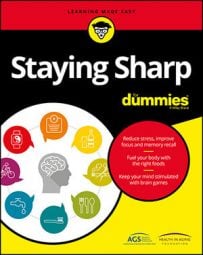Test your logic and reasoning
The figure shows a common task that instructors give to psychology students to test their logic and reasoning skills. You see four cards, with only one side showing.Here's the rule: If one side of the card displays a vowel, then the other side of the card can only show an even number.
Which card do you turn over first to check this rule? Most people turn over the card with the letter A. That's correct. Now which card do you turn over next? You may be tempted to turn over the card with the number 2, but you should actually turn over the card with the number 1.
Why? Look at the rule again: If one side of the card displays a vowel, then the other side of the card can only show an even number.
You turned over the card with the letter A to confirm this rule because A is a vowel. You don't need to turn over the card with letter B because the rule said nothing about consonants. You may think you don't need to turn over the card with the number 1, but you do need to check whether it has a vowel on the other side. If it does have a vowel, then it's violated the rule. You don't need to turn over the card with the number 2 because the rule doesn't state what should happen if you have an even number on one side.
If you're still puzzling over this, don't worry. Most people find this test very difficult. Try this version.
Here's the rule: If you're under 21, you can't drink alcohol.
You're the bartender and you have to make sure that no one breaks this rule. This figure shows what you see at one table.
Whose age will you check? You'll probably check the first person who looks under 21. And you'd also check the person drinking beer to make sure that he's 21 or over. You aren't worried about the person drinking cola because it doesn't matter whether he's older or younger than 21; cola isn't an alcoholic drink.
These kinds of tasks aren't meant to frustrate psychology students (though they may do that too!) but to illustrate how people use logic and reasoning in everyday situations. In the scenario with the drinks, you can save time by checking only certain people's ages rather than checking everyone's age.
Use your reasoning skills to the max
Life presents you with many opportunities to recognize patterns and use your reasoning skills to their full potential.Here are some suggestions that can help you strengthen the patterns and associations you may need daily:
- Face facts. Test your visual memory. Look at famous faces and see how quickly you can come up with the people's names. Too easy? Try to come up with one fact about each person. Remember, don't just use "celebrity" faces; try to include political and historical figures as well.
- Remember me. Try the face facts game with familiar faces. Start with people you know well — family members and close friends. This time, try to state five things you know about each person. Now look at photos of people you may not know as well — maybe colleagues from work or friends from school with whom you're no longer in contact. Try to remember the people's names and one thing about each of them. For work colleagues or school friends remember what department they work in or a funny incident that you shared in class.
- Filter distractions. You're more prone to forget things when you're distracted. So the next time someone's giving you directions over the phone, go somewhere quiet, shut the door, and focus only on the conversation. When you're introduced to someone new at a buffet luncheon, stop refilling your empty plate and look at her, shake her hand, and repeat her name. Increase your focus by strengthening your ability to filter out distractions. Work on being present like this so it becomes an automatic practice for you.
- Remember where you were. Your brain remembers odd little bits of information, such as the smell of the freshly cut grass in the park when your friend gave you directions to the party on the weekend, or the smell of the pizza at the office party as your boss introduced you to an important potential client. These bits of information that your brain stores may seem irrelevant, but they can serve as powerful clues to trigger your memory. When you're trying to remember something, think back to where you were when you first heard the information. Do you remember anything specific about the location? What was the person wearing? What were you doing? All these questions can help you reconstruct the moment, which in turn unlocks your memory.
- Make your own box. It's no wonder that the saying "Think outside the box" has caught on. People who can think beyond what others normally do have an advantage. They're more creative and come up with ideas that the others haven't thought about before. If you can't find a solution right away, maybe you're approaching the problem in the wrong way. Try to ask different questions. Think outside the box. The solutions that come to you may be surprising.



